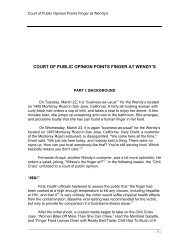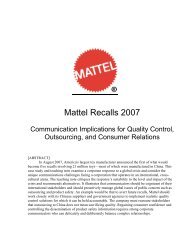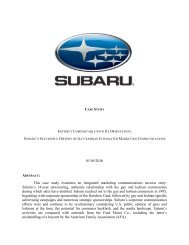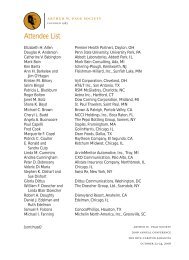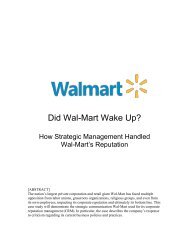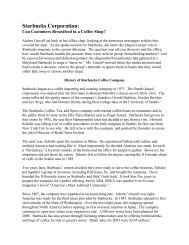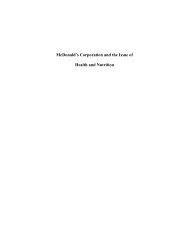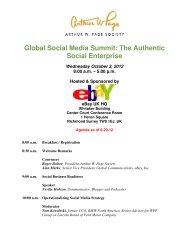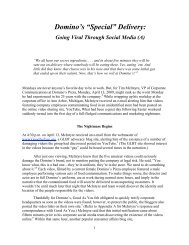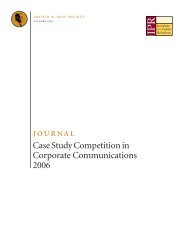Whole Foods/Wild Oats Merger: - The Arthur Page Society
Whole Foods/Wild Oats Merger: - The Arthur Page Society
Whole Foods/Wild Oats Merger: - The Arthur Page Society
Create successful ePaper yourself
Turn your PDF publications into a flip-book with our unique Google optimized e-Paper software.
which owned nearly 98 percent of the market, did not violate the law because control of<br />
manufacturing did not necessarily indicate control of trade. This ruling raised questions as<br />
to the validity of the Sherman Act. 30<br />
As a result, Congress passed the Clayton Antitrust Act, an amendment to clarify what<br />
constitutes an ‘unreasonable’ trade agreement and to seal loopholes in the preceding law.<br />
4.4. <strong>The</strong> Clayton Antitrust Act & <strong>The</strong> Federal Trade Commission (1914)<br />
<strong>The</strong> Clayton Act was enacted during President <strong>The</strong>odore Roosevelt’s “trust‐busting”<br />
campaign in 1914. Besides prescribing a clearer interpretation of the Sherman Act, the law<br />
prohibited specific business practices that Congress deemed to be unfair. This included<br />
discriminating prices, tying contracts, allowing board members to acquire stock in<br />
competing firms and interlocking directorates (when an individual sits on the boards of<br />
companies in opposition). 31<br />
In addition to these provisions, Section 7 of the Clayton Act directly addressed the<br />
issue of mergers and acquisitions. It stated:<br />
That no corporation engaged in commerce shall acquire, directly or indirectly, the<br />
whole or any part of the stock or other share capital of another corporation engaged<br />
also in commerce, where the effect of such acquisition may be to substantially lessen<br />
competition between the corporation whose stock is so acquired and the corporation<br />
making the acquisition, or to restrain such commerce in any section or community, or<br />
tend to create a monopoly of any line of commerce. 32<br />
That same year, Congress also passed the Federal Trade Commission Act, which<br />
established the Federal Trade Commission (FTC) as the definitive body to enforce antitrust<br />
laws. In conjunction with the Department of Justice, which was previously ill‐equipped to<br />
pursue antitrust violations, the FTC was given the responsibility of investigating ”unfair<br />
methods of competition,” as well as the authority to issue cease and desist orders to<br />
companies engaging in “unfair or deceptive acts or practices.” 33 This meant that the<br />
Department of Justice and the FTC could dismantle an organization if an investigation<br />
shows that the company broke the law.<br />
4.5. Additional Antitrust Laws<br />
Subsequent laws were passed in order to strengthen regulations on shady business<br />
practices. <strong>The</strong> Robinson‐Patman Act of 1936 strengthened restrictions on price<br />
discrimination, or offering different prices to select customers. 34 In 1950, the Cellar‐<br />
Kefauver Act supplemented the Clayton Act to include acquisitions of assets when the<br />
intent is to decrease competition. 35<br />
Moreover, the Hart‐Scott‐Rodino Antitrust Improvements Act of 1976 (HSR)<br />
established the Premerger Notification Program, which requires all large mergers and<br />
acquisitions to be reviewed by the FTC before a deal can be settled. Essentially, the HSR Act<br />
9



